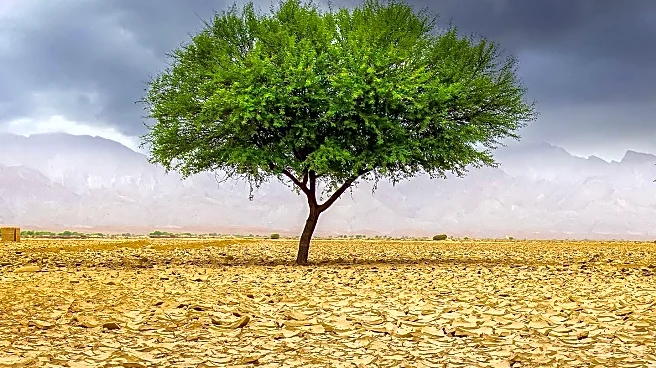What is the story about?
What's Happening?
The literary world is witnessing a shift towards 'cli-fi' or climate fiction, a genre that explores the impact of climate change through storytelling. Historically, climate novels have often depicted dystopian futures, focusing on catastrophic events and societal collapse. However, there is a growing call for more optimistic narratives that inspire hope and action. Authors like Sarah Hall are exploring this shift, questioning whether literature can play a role in encouraging positive environmental change. Hall's latest work, 'Helm,' attempts to balance the grim realities of climate change with a more hopeful outlook, suggesting that fiction can help readers envision a better future.
Why It's Important?
The move towards positive climate fiction is significant as it reflects a broader cultural shift in how society perceives and addresses climate change. By focusing on hopeful narratives, authors can potentially influence public perception and inspire action towards sustainability. This approach contrasts with the often bleak and fatalistic views presented in traditional climate fiction, which may lead to a sense of helplessness. By offering stories of resilience and adaptation, these novels can motivate readers to engage with environmental issues more constructively, potentially influencing policy and individual behavior towards more sustainable practices.
What's Next?
As the genre of climate fiction continues to evolve, it is likely that more authors will explore optimistic narratives. This could lead to a diversification of stories that not only highlight the challenges of climate change but also propose solutions and celebrate human ingenuity. The publishing industry may see an increase in demand for such narratives, encouraging more writers to contribute to this growing genre. Additionally, these stories could influence other media forms, such as film and television, further spreading the message of hope and action in the face of climate change.
Beyond the Headlines
The shift towards positive climate fiction also raises questions about the role of literature in shaping societal values and actions. It challenges the traditional view that dystopian narratives are more compelling, suggesting that stories of hope can be equally engaging and impactful. This change may also reflect a broader societal desire for narratives that empower rather than paralyze, encouraging a more proactive approach to global challenges.















